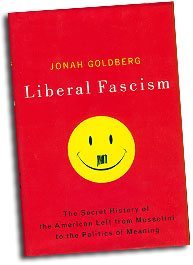
Words can have a magical effect on people. Their simple usage can even change the way the public views people and positions. Long ago, the left figured this out and has taken full advantage of the fact.
Thus, when homosexuals became “gays” and pro-abortionists became “pro-choicers” their status somehow improved, in spite of the fact that there is nothing gay about the homosexual lifestyle and killing a pre-born child is not much of a choice at all. Professor Plinio Corrêa de Oliveira explains masterfully how this technique is used in his 1965 study: Unperceived Ideological Transshipment and Dialogue.
It works because man is a logical being. Thus, if labels misrepresent reality, he tends to make that which is described fit the description.
However, this tactic is not only useful to improve one’s image before the public; it is an effective tool to demonize one’s opponents, as well. This is well illustrated when modern liberals dub anyone who disagrees with them a fascist.
At first glance, this may seem almost reasonable. Common understanding places communism on the extreme left and fascism and Nazism as its right-wing counterparts. Accordingly, the more one leans to the radical right, the closer he approaches fascism.
Fascism: A Leftist Ideology
However, this could not be further from the truth. Fascism and Nazism always were, are now and always will be ideologically leftist. Whether or not they have squabbled with communists, socialists or any other leftist movement throughout history cannot change this fundamental fact.
Furthermore, the foundation of modern leftist thought can be traced in an unbroken chain from Rousseau and Robespierre, who respectively led the thought and action of the French Revolution, to Mussolini, Hitler, Woodrow Wilson, Franklin Roosevelt, the hippy movements of the sixties, John F. Kennedy and Lyndon Johnson.
Such is the thesis of Jonah Goldberg’s recent book: Liberal Fascism: The Secret History of the American Left from Mussolini to the Politics of Meaning. It is a convincing and well-documented historical analysis that is certainly unique in its extent.
In it, Mr. Goldberg demonstrates how all those mentioned above shared essential convictions that molded their policy. These include: an emphasis on the common good over individual rights; a semi-deification of the state, which if properly managed and given limitless power, can overcome all man’s problems; a desire to establish absolute unity of thought and action; belief that everything, including religion, must be aligned with the objectives of the state; and the rejection of any differing identity.
Not surprisingly, communists and Nazis share these convictions as well. What, then, separates these three totalitarian systems? According to Goldberg, communism promotes worldwide revolution, thus, a universal icon, the proletariat, is deified. Mussolini, believing that general revolution was overly ambitious, localized his goals and idolized the nation. To the same end, Nazism deified the German race.
However, Mr. Goldberg is careful not to get carried away. He continuously admits that modern leftists, unlike their ideological ancestors, do not openly promote genocide or violence (although their suppression of Christianity is certainly approaching a state of persecution). Nevertheless, many of the foundations of fascist thought remain perfectly intact.
Left-wing Hysteria
Expectedly, liberals have responded violently to the book; but surprisingly, many critics are grossly uninformed about its contents. Some of their commentaries are so fraught with error, it seemed that they never read the work.
One review went so far as to complain that Mr. Goldberg never defined the term “fascism,” apparently not realizing that there is a definition on page 23 that is so extensive it occupies ten lines of text.
Others take sections out of context. For example, Mr. Goldberg comments how the Nazis were animal rights activists and organic food proponents. As a curiosity, he links this to the same ideas, which proliferate among today’s American left.
Although this takes up little space in the book’s more-than 400 pages, and is presented more as a curiosity than a substantive argument, critics present it as one of the book’s main themes.
From the Peanut Gallery
That is not to say that every point in the book is rock solid. Certain areas could, perhaps, use a little more research and explaining. Nevertheless, the book’s mass quantity of evidence and documentation certainly cannot be ignored. Furthermore, it is excusable in such a ground-breaking and comprehensive work, that some minor points lead readers to further research.
Nevertheless, the book’s conclusion is utterly disappointing, especially when Mr. Goldberg states that:
…it is impossible to drain entirely the fascist toxins from our culture. Truth be told, that’s not so worrisome. The lethality of a poison depends on the dosage, and a little fascism, like a little nationalism or a little paternalism, is something we can live with.
This is ridiculous. If a small dose of poison will not kill a person, it certainly will not promote his health either.
Furthermore, it is shocking that Mr. Goldberg is not opposed to homosexual “marriage,” even stating that the demand for these unnatural unions is: “a hopeful sign.” This is especially frustrating, since it does not follow from his opinions as expressed elsewhere in the book.
Also, some of his quotations, especially from recent films, contain vulgarities and improper sexual content.
Last, it is difficult to gauge Mr. Goldberg’s opinions of the Catholic Church, since he alternates between complaint against and support of the institution throughout the book.
Conclusion
In spite of these drawbacks, Liberal Fascism is a must-read for anyone who is sick and tired of the left throwing their own dirty laundry at those who disagree with them. It is thoroughly documented and a real eye-opener for anyone whose historic knowledge has been influenced by revisionist leftists, more concerned with promoting an agenda than revealing truth.
However, anyone seeking truth will find a good deal of it spelled out clearly in the book. Any intellectually honest leftist would also profit from reading it, as long as he is not afraid to learn true history without the filter of liberal fascist censorship.

